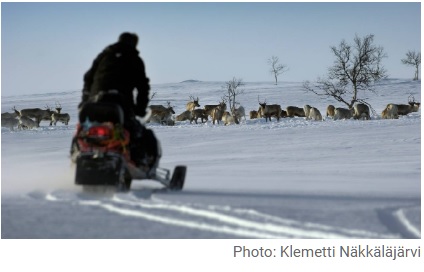Government’s analysis, assessment and research activities report: There are opportunities for the Saami people to adapt to climate change.
Source:Tietokayttoon.fi
 The Saami people observed the first signs of climate change in the 1960s and the changes have accelerated over the course of the 2000s, according to a study by the University of Oulu. The study examined how the Saami have adapted to climate change in reindeer husbandry and explored ways for the Saami to adapt to climate change in a culturally sustainable manner.
The Saami people observed the first signs of climate change in the 1960s and the changes have accelerated over the course of the 2000s, according to a study by the University of Oulu. The study examined how the Saami have adapted to climate change in reindeer husbandry and explored ways for the Saami to adapt to climate change in a culturally sustainable manner.
The SAAMI – Adaptation of the Saami people to climate change research project has produced new information on Saami culture, Saami reindeer husbandry, observations of climate change and the adaptation of the Saami people to climate change.
Climate change affects the entire Saami culture
The Saami have observed changes in the seasons, temperatures, precipitation, flora, fauna and reindeer behaviour. The variability of conditions has increased, as has the risk of accidents. The project generalised the observed effects into three categories: direct, indirect and tertiary. All in all, 74 direct, 12 indirect and 16 tertiary impacts were identified. Direct observations refer to effects observed in flora, fauna and conditions, indirect observations refer to extensive changes in the ecosystem, and tertiary observations constitute permanent changes in the culture and means of livelihood.
The Saami homeland accounts for about 10 per cent of the total area of Finland, and the conditions vary from region to region. The project identified 10 different reindeer husbandry models. The Saami have adapted to climate change by providing supplementary feeding, using technology, by means of siida system and permanently altering the reindeer husbandry model. The adaptation measures have had impacts on the Saami culture and community.
The Saami believe that their culture will change as a result of climate change but will nevertheless be preserved
The main finding of the research project is that as a means of livelihood, reindeer husbandry is adaptable to climate change, but as a cultural way of life, it is highly endangered. The Saami are concerned about the preservation and intergenerational transfer of traditional knowledge under the cross-pressures created by climate change, competing forms of land use, economic boundaries and legislation. Adaptation to climate change constitutes cultural change. It is possible to create ways to support the preservation and intergenerational transfer of traditional Saami knowledge through education and actions by the authorities.
Participation of the Saami in climate policy should be increased
The project examined how climate change programmes take into account the inclusion of the Saami and the adaptation of the Saami to climate change. According to the report, climate change programmes make only general references to the Saami people, and their participation in the preparation of the programmes has been limited. The project proposes further developing the participation of the Saami in climate-related decision-making. With this objective in mind, the project proposes establishing a joint expert body to develop the interaction between climate researchers and holders of traditional Saami knowledge.
Climate change affects the lives of all Arctic Indigenous peoples
The extensive data collected in the project made it possible to obtain a general picture of how climate change affects Arctic Indigenous peoples. The Indigenous peoples of the Arctic have observed changes in the conditions in their homelands and have adapted their livelihoods in response. According to the research data, the changes observed concern, in particular, the length of the seasons, warming of the winter and changes in vegetation and weather conditions. Changes in conditions and the resulting adaptation measures have had a weakening effect on traditional knowledge, while the unpredictability of weather conditions has increased the risk of accidents and altered the structure of the traditional seasonal cycle. There is no research data available on the observation of climate change among smaller Indigenous peoples. The observations of the Saami people are very similar to those of other Arctic Indigenous peoples.
Project carried out with extensive material and interaction
The SAAMI project was carried out at the Center for Environmental and Respiratory Health Research (CERH) of the University of Oulu as part of the Government’s analysis, assessment and research activities. The project’s anthropological field work was based on in-depth interviews with 72 Saami people. The interviewees are from all 13 reindeer herding cooperatives in the Saami homeland. The target group was Saami reindeer herders. Other material used in the research included strategies dealing with climate change and peer-reviewed studies on the observation of climate change among Arctic Indigenous peoples. The project also utilised materials produced by various authorities and research institutes.
The project steering group included representatives from the Ministry of the Environment, the Ministry of Agriculture and Forestry, the Ministry of Justice, the Ministry of Education and Culture and the Ministry of Economic Affairs and Employment. The project is part of the implementation of the 2018 Government plan for analysis, assessment and research. The project has the free, prior and informed consent of the Saami Parliament and the Skolt Saami Village Assembly. The project’s proposals for action have been prepared in cooperation with the Saami Parliament and the Skolt Saami Village Assembly.
Work will continue through cooperation between the authorities and the Saami people
The project has drawn up 14 proposals for action to develop opportunities for the Saami to adapt to climate change in a culturally sustainable manner and to transfer their traditional knowledge from generation to generation. The steps needed to advance the proposed actions will be considered in cooperation between the responsible ministries, the Saami Parliament and the Skolt Saami Village Assembly. The main findings of the project were presented at a seminar held on 11 February 2020.
Inquiries:
Ilkka Heikkinen, Nature Conservation Adviser, Chair of the steering group, Ministry of the Environment, tel. +358 295 250 079,
Professor Jouni Jaakkola, Principal Investigator, Leader of the SAAMI project, University of Oulu, tel. +358 40 672 0927,
Dr Klemetti Näkkäläjärvi, Postdoctoral Researcher, Co-Principal Investigator of the SAAMI project, tel. +358 40 537 1584, (including contacts in the North Saami language)
The Government’s joint analysis, assessment and research activities (VN TEAS) produce data used to support decision-making, everyday operations and knowledge-based management. They are guided by the Government’s annual plan for analysis, assessment and research. The content of the reports published in the publication series of the Government’s analysis, assessment and research activities is the responsibility of the producers of the data in question and does not necessarily represent the view of the Government.


